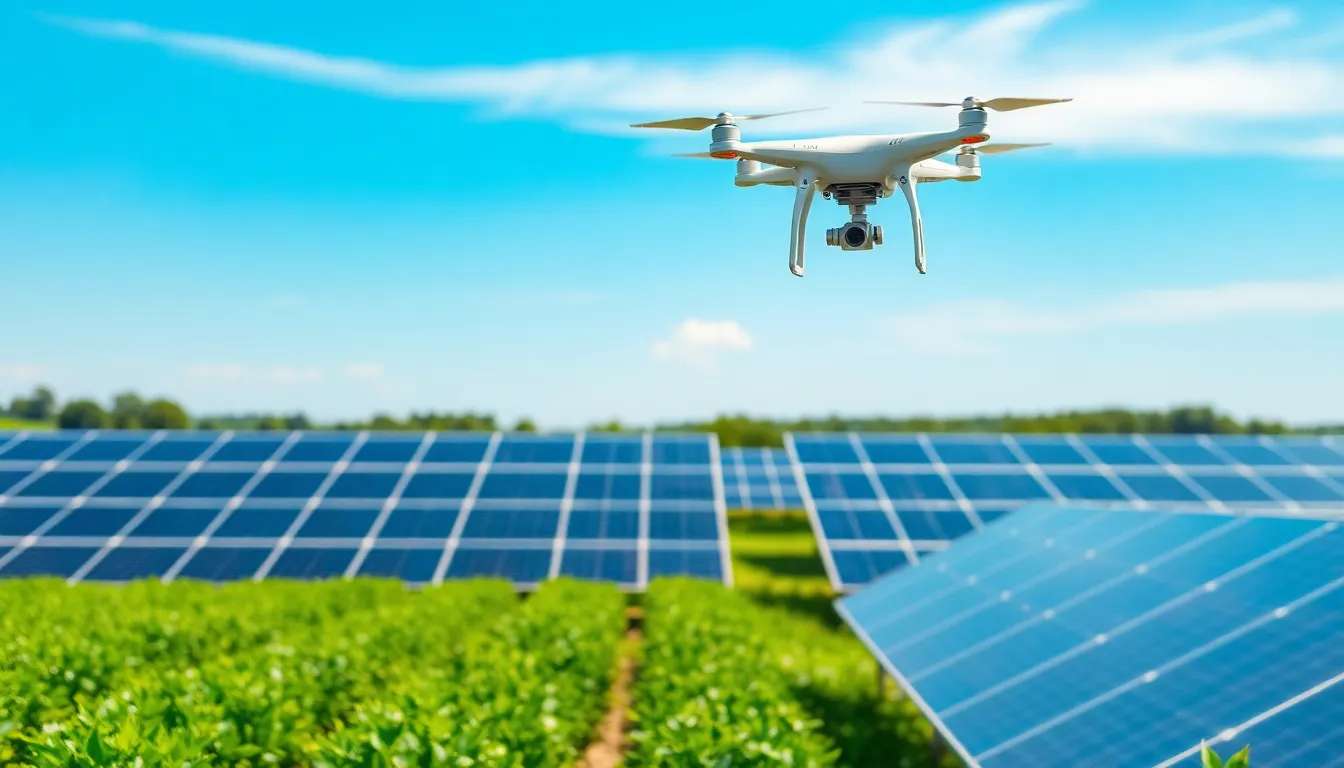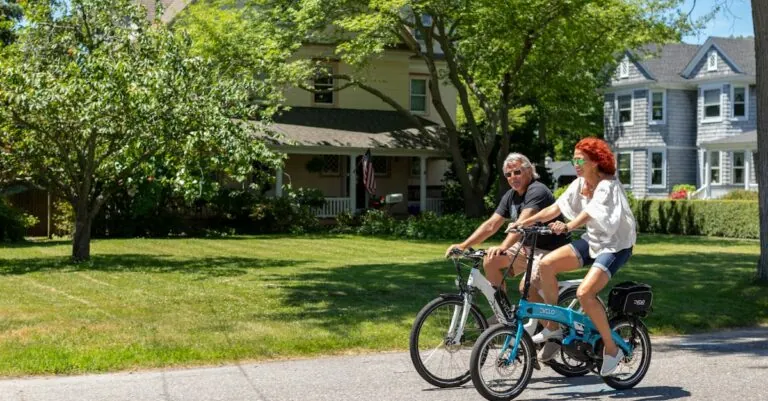In a world where tech seems to evolve faster than a toddler on a sugar rush, sustainable tech solutions are the unsung heroes we didn’t know we needed. Imagine gadgets that not only make life easier but also give Mother Nature a high-five. It’s like having your cake and eating it too—except this cake is eco-friendly and guilt-free!
From solar-powered devices to energy-efficient software, these innovations are transforming the way we live and work. They’re not just saving the planet; they’re also saving us from those dreaded energy bills. So, buckle up and get ready to discover how sustainable tech can turn your life into a greener, smarter adventure. Because who said saving the planet couldn’t be fun?
Table of Contents
ToggleOverview of Sustainable Tech Solutions
Sustainable tech solutions encompass innovations designed to minimize environmental impact while maximizing efficiency. These technologies benefit both consumers and the planet.
Definition and Importance
Sustainable tech refers to tools and systems developed to promote environmentally friendly practices. It plays a vital role in combating climate change. By reducing waste and energy consumption, sustainable technologies help create a circular economy. They prioritize renewable resources over finite materials, ensuring long-term viability. Both businesses and individuals can benefit from adopting these solutions, leading to reduced operational costs and a smaller carbon footprint. Understanding the significance of sustainable tech enhances awareness about its potential impact on future growth.
Current Trends in Sustainable Technology
Current trends highlight rapid advancements in sustainable tech. Innovations like artificial intelligence optimize energy use in various sectors. Businesses are increasingly implementing solar energy systems to power operations, decreasing reliance on fossil fuels. Additionally, electric vehicles have gained popularity, supporting a shift toward cleaner transportation. The rise of smart buildings features technologies that improve energy efficiency while enhancing occupant comfort. Sustainability-focused startups are emerging, offering creative solutions across diverse industries. Continued growth in this sector indicates a shift toward a more sustainable future, aligning economic goals with environmental responsibility.
Top Sustainable Tech Solutions

Numerous innovative technologies support sustainability. These solutions significantly impact both environmental health and economic efficiency.
Renewable Energy Technologies
Solar panels convert sunlight into electricity efficiently, making renewable energy accessible. Wind turbines harness wind power, contributing clean energy to the grid. Hydropower systems utilize flowing water, generating electricity without harmful emissions. Geothermal systems tap into the Earth’s heat, providing a steady energy source. These technologies reduce reliance on fossil fuels and lower greenhouse gas emissions, fostering a cleaner environment.
Smart Agriculture Innovations
Precision agriculture employs data analytics to optimize farming practices, conserving resources and enhancing yields. Drones monitor crop health, allowing farmers to intervene quickly when needed. Automated irrigation systems deliver water more efficiently, reducing waste significantly. Vertical farming maximizes space, producing food with minimized land use. These innovations not only promote sustainable practices but also support food security while addressing the challenges of climate change.
Benefits of Sustainable Tech Solutions
Sustainable tech solutions offer numerous benefits for both the environment and the economy. These innovations play a crucial role in promoting a sustainable future.
Environmental Impact
Sustainable technologies significantly reduce carbon footprints. Solar panels, for example, harness renewable energy from the sun, minimizing reliance on fossil fuels. Innovations such as wind turbines and geothermal systems further decrease greenhouse gas emissions throughout various sectors. Smart agriculture practices enhance resource efficiency, promoting sustainable food production. By using drones for monitoring crops and automated irrigation systems, they optimize water usage, leading to conservation. These advancements collectively foster a healthier planet, aligning economic progress with environmental health.
Economic Advantages
Investing in sustainable tech solutions leads to substantial economic savings. Energy-efficient devices lower utility bills for households and businesses alike. Additionally, companies benefit from reduced operational costs through the adoption of energy optimization technologies. Electric vehicles, once considered costly, have become increasingly affordable, offering lower maintenance costs compared to traditional cars. The transition to renewable energy sources enhances long-term financial stability. Startups focused on sustainability also create new jobs, driving economic growth while addressing environmental challenges. These economic advantages support a balanced approach to development.
Challenges in Implementing Sustainable Tech
Implementing sustainable tech involves several challenges that hinder its seamless adoption. These challenges encompass technological barriers and financial considerations.
Technological Barriers
Developers often face significant technological hurdles. Legacy systems frequently lack compatibility with newer, sustainable solutions. High integration complexity leads to increased project timelines and budgets. Limited access to advanced technologies stifles innovation in many regions. Furthermore, insufficient expertise in sustainable tech among professionals restricts deployment. It’s crucial for organizations to invest in training and resources to overcome these barriers.
Financial Considerations
Financial challenges play a pivotal role in sustainable tech adoption. Initial investments for renewable energy infrastructure can be substantial. Small businesses particularly struggle to allocate sufficient funds for these upgrades. Additionally, potential returns on investment may take years to materialize, discouraging immediate investment. Budget constraints often lead organizations to prioritize short-term gains over long-term sustainability. Adopting innovative financial models may mitigate these challenges and facilitate growth in this sector.
Future of Sustainable Tech Solutions
Sustainable tech solutions show promise for future advancements that connect innovation with environmental stewardship. Continued progress in renewable energy, automation, and smart technologies drives this evolution.
Upcoming Innovations
Emerging technologies like blockchain for energy transactions improve transparency and efficiency. Machine learning offers predictive analytics for energy consumption, enhancing optimization efforts. Biodegradable materials for electronics reduce waste and promote responsible disposal. Advanced energy storage solutions, such as solid-state batteries, extend the lifespan and effectiveness of renewable energy systems. As these innovations materialize, they will reshape industries and everyday life.
Policy and Regulation Impacts
Government policies often shape the development of sustainable tech. Supportive regulations can incentivize the adoption of eco-friendly practices. For example, tax credits for renewable energy projects encourage investment and innovation. Additionally, emissions standards push businesses to adopt cleaner technologies. As regulations evolve, they drive industries toward sustainability, fostering a framework that prioritizes eco-conscious solutions.
Sustainable tech solutions represent a pivotal shift toward a more eco-conscious future. By embracing innovations that prioritize efficiency and environmental health, individuals and businesses can significantly reduce their carbon footprints while enjoying economic benefits. The ongoing advancements in this field promise to create a more sustainable world through smarter energy use and resource management.
As the landscape of technology continues to evolve, the integration of sustainable practices will become increasingly essential. By staying informed and proactive, everyone can contribute to this vital movement, ensuring a healthier planet for future generations. The journey toward sustainability is not just necessary; it’s an opportunity for growth and innovation.


